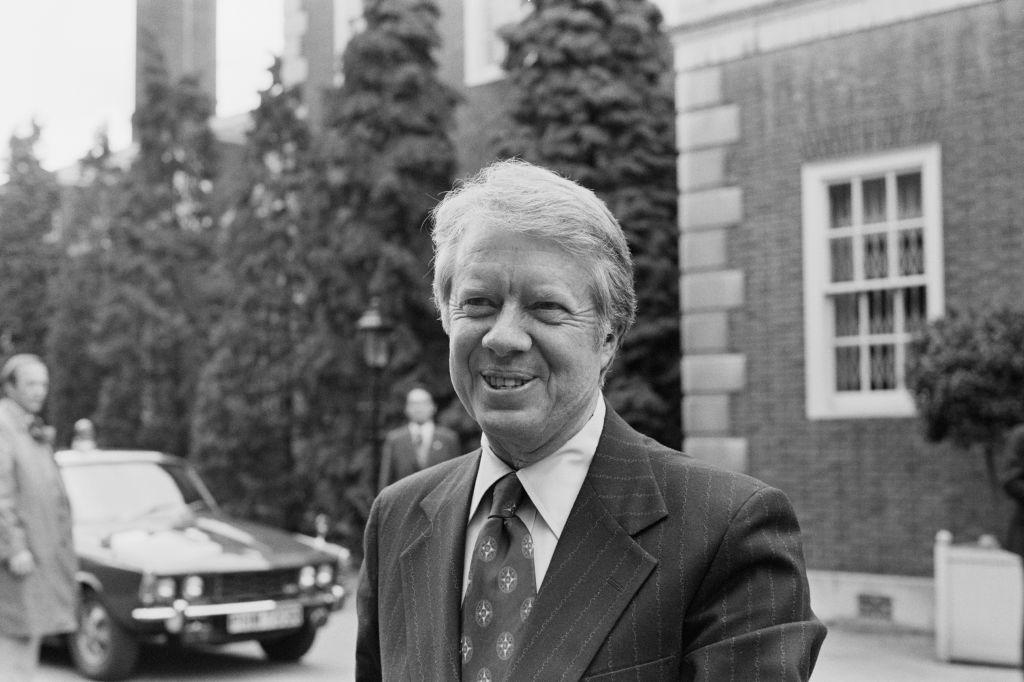Jimmy Carter will be remembered as a decent, honorable man of faith, who lived a productive life according to those high standards, both publicly and privately.
He was an outlier in his forging of a productive life after leaving office. Instead of grifting and selling access to policymakers, like so many former politicians do today, he had a distinguished second career promoting and monitoring democratic elections around the world. That legacy will live on in the work of the Carter Center in Atlanta. So will his work with Habitats for Humanity, building homes for the poor.
He will be remembered, too, for his long, loving marriage to Rosalynn, whom he married in 1946, when he was a young naval officer. She died only a year ago.
It was a remarkable life.
Recollections of Carter’s presidency will, unfortunately, be very different. He was a failed, one-term leader. The public rendered that verdict in 1980 when they abandoned him for a man who promised to take the country in a dramatically different direction. Nothing in subsequent years has changed that snap judgment of Carter’s presidency.
The echoes of today’s politics are obvious. Ronald Reagan’s success in office congealed the sour memories of Carter’s presidency. Even the most partisan historians cannot rescue it. What differentiates Carter’s years from today’s failed one-term presidency is, in a word, probity. Jimmy Carter refused to use his public stature for private financial gain.
That sense of rectitude helped Carter rise to national prominence in 1976, when the former Georgia governor ran for the Democratic nomination. A centrist outsider, he was almost unknown to the public before his success in the primaries.
In the general election, his policy proposals were not much different from the incumbent Republican, Gerald Ford. Carter’s principal asset was personal: he was perceived, quite accurately, as a decent man untarnished by the stench of Washington after Richard Nixon.
Ford was also honest and decent, but he was saddled with two insurmountable burdens: he was a longtime Washington politician and, even more important, he had pardoned Nixon for his crimes. That looked corrupt and partisan, even if it was not.
The pardon was the right decision for the country’s future but not for Ford’s. Putting Nixon in the dock for obstruction of justice would have transfixed the nation for months and prevented America from moving forward, putting Watergate and John Mitchell’s Department of Justice behind it. Ford made that case to the nation, figuring Nixon had been punished enough for his humiliating, unprecedented abdication. The public never embraced that decision. It damaged Ford’s election chances in 1976 and may have been just enough to allow Carter to win a close contest.
Carter ran as a post-racial, Southern centrist, much as Bill Clinton did in 1992, though Carter governed more to the left than the public anticipated. Clinton initially did as well, but then he adroitly moved back to the middle after his party’s defeat in the midterms. Live and learn. That was Clinton’s famous “triangulation” — and it won him enough support for reelection. Carter never triangulated. The overriding question facing today’s Democratic Party is whether it will make that course correction.
As president, Jimmy Carter had one enormous success: the 1979 Camp David Accords between the Israelis and Egyptians. The deal was mediated by Carter at the presidential retreat and signed on the White House lawn by Menachem Begin and Anwar Sadat.
Unfortunately, the hopes for a strong, long-term bond between the two Middle Eastern countries were never realized. After Sadat was assassinated, Egypt and Israel settled into a long “cold peace” instead of a warm one. Relations are still frigid, though not overtly hostile.
The other hope was that the Israeli-Egyptian deal would lay the foundation for a Palestinian state, which could live in peace with Israel. That, too, failed. The Jewish state was willing to take risks, notably permitting Palestinian leader Yasser Arafat to return from his exile in Tunisia in 1993. Arafat had been expelled there not by Israel but by Lebanon, after he had failed to overthrow the government there. He was in Lebanon only because he had failed to overthrow the regime in Jordan.
Arafat turned out to be a slow learner. He was a committed revolutionary, not a state builder, who chose to continue the PLO’s armed resistance against the Jews rather than begin building local governments in the West Bank. It was a decision that sealed the fate of the Palestinians. For decades, the only opposition to Arafat’s organization has been even more extreme Islamist groups, bent on Israel’s destruction.
That outcome rendered a final verdict on the Carter’s 1979 peace deal. It was a valiant, hopeful effort, not the beginning of a wider peace.
Even more important for Carter’s legacy was another change in the Middle East: the revolutionary upheaval in Iran. That story is well-known. The shah’s pro-American regime was overthrown by Islamists, led by the Ayatollah Khomeini, who had been sheltered by the French government.
Regime change in Iran had two devastating effects on the Carter presidency. It led to a doubling of gas prices, with a predictable decline in US (and global) income. And it led to the capture of fifty-three US diplomats and civilians at the American Embassy in Tehran. They were held hostage from November 4, 1979 until their release the day Carter left office, January 20, 1981. For over a year, the hostage drama was the lead story on the nightly news. It was a public humiliation of the United States and its leader, President Carter. The humiliation was compounded by feeble, failed rescue attempt, the oil embargo and the recession.
Carter was voted out — and Reagan in — to stop the repeated humiliation and restore America’s preeminent place in the world. The public’s verdict on the Carter presidency remains as its lasting legacy.
Jimmy Carter’s personal legacy, however, goes beyond his tarnished record in office. He served the public for decades after returning to Georgia. He led an exemplary life of rectitude and decency.
May his memory be a blessing, cherished by those who knew and loved him.


























Leave a Reply